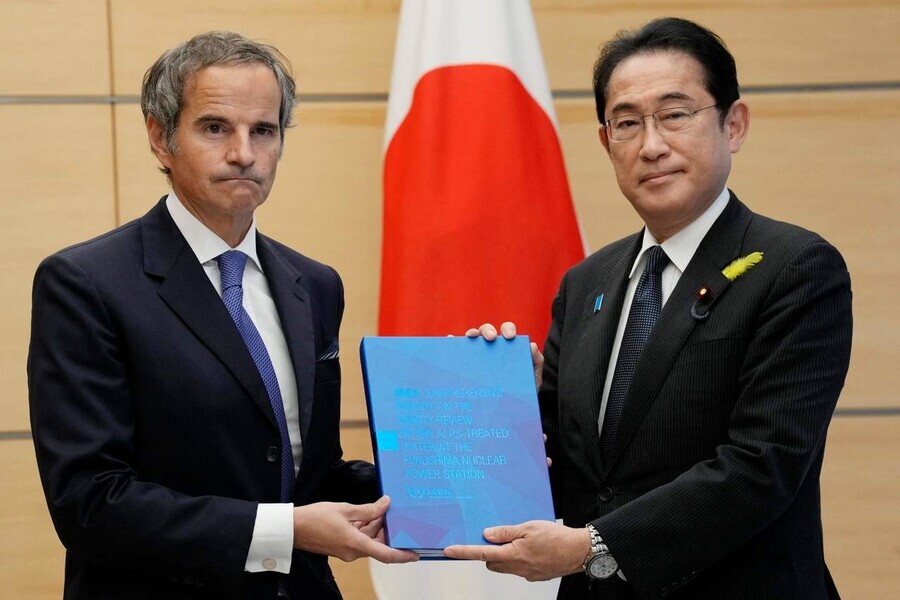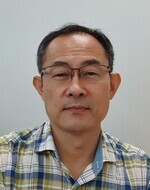hankyoreh
Links to other country sites 다른 나라 사이트 링크
[Reporter’s notebook] How unscientific explanations undermine the credibility of the IAEA’s report

The South Korean government and the ruling People Power Party (PPP) have emphasized the “scientific” nature of the International Atomic Energy Agency (IAEA) examination of the safety of Japan’s plan to release contaminated water from the Fukushima Daiichi nuclear power plant into the ocean.
But is this actually the case? In my observations of the events from the IAEA’s announcement of its final report to the recent three-day South Korea visit by Director General Rafael Grossi, I was left with an increasingly strong perception: leaving aside any question of how scientific the examination itself was, the methods used to explain those findings have not been especially scientific.
When it comes to announcing scientific conclusions, form is as important as content. When form is lacking, it is taken as a reflection of content inadequacies.
In that sense, the IAEA’s announcement of its final report on July 4 stands in contrast with the announcement of the “AR6 Synthesis Report: Climate Change 2023” by the Intergovernmental Panel on Climate Change (IPCC) three months ago.
The IPCC shared its announcement schedule roughly a month ahead of time and held simultaneous online and offline press conferences for global media when the announcement was made. It had the major authors of the report present to answer questions and arranged separate interviews with them.
This was also the case with its “Physical Science Basis” report announcement two years earlier and its “Impacts, Adaptation and Vulnerability” and “Mitigation of Climate Change” reports last year.
In contrast, the IAEA merely posted the final report on its website after an “event” in which Grossi delivered it to Japanese Prime Minister Fumio Kishida. Evoking the image of a contractor turning in a commissioned project to the party that ordered it, the event was a symbolic moment showing the nature of this report.
Indeed, the IAEA has been open from the outset about its examination of the water release plan being conducted after Japan’s request for support toward a “safe” discharge, with the agency signing a “terms of reference” document and reaching an agreement with Japan on the scope of the examination. The IAEA categorizes such activities as “review missions and advisory services” to assist member countries.
To call these activities a “neutral examination” in the context of the debate over whether the contaminated water should be released amounts more or less to fake news.
Regardless of the context behind the examination, the review process itself may or may not be scientific. But the explanation process at least has failed to meet the standards for a scientific announcement. For it to be called “scientific,” the experts who performed the review would need to appear before the press and fellow experts to submit to some tough questions.
Instead, Grossi has monopolized the occasions for explanation, without exposing the experts in question to the media. Even here, his explanations have been inadequate. After coming all the way to South Korea to give an “explanation,” he did not hold a single press conference — instead cherry-picking which news outlets he would grant interviews to before returning.
It’s difficult to explain the decision not to hold a press conference — which might have saved some time compared with separate interviews with five different news outlets — except as a decision meant to avoid uncomfortable questions.
Grossi is not a scientist with a history of studying atomic energy or radioactivity. Hailing from Argentina, he is a career diplomat who studied international relations and political science before establishing his career in the field of nuclear non-proliferation and disarmament.
While he may be loath to admit it, he is not suited to the role of an expert giving a scientific explanation for such reports. His remarks about how people can “drink” and “swim in” the contaminated water are not the language of science, but the language of diplomacy and politics.
When explanations are unscientific and give the impression of pushing people to just “trust us when we say it’s safe,” that will only undermine trust in the report.

By Kim Jeong-su, senior staff writer
Please direct questions or comments to [english@hani.co.kr]

Editorial・opinion
![[Editorial] Silence won’t save Yoon [Editorial] Silence won’t save Yoon](https://flexible.img.hani.co.kr/flexible/normal/500/300/imgdb/original/2024/0701/681719819632087.jpg) [Editorial] Silence won’t save Yoon
[Editorial] Silence won’t save Yoon![[Column] The miscalculations that started the Korean War mustn’t be repeated [Column] The miscalculations that started the Korean War mustn’t be repeated](https://flexible.img.hani.co.kr/flexible/normal/500/300/imgdb/original/2024/0630/9717197068967684.jpg) [Column] The miscalculations that started the Korean War mustn’t be repeated
[Column] The miscalculations that started the Korean War mustn’t be repeated- [Correspondent’s column] China-Europe relations tested once more by EV war
- [Correspondent’s column] Who really created the new ‘axis of evil’?
- [Editorial] Exploiting foreign domestic workers won’t solve Korea’s birth rate problem
- [Column] Kim and Putin’s new world order
- [Editorial] Workplace hazards can be prevented — why weren’t they this time?
- [Editorial] Seoul failed to use diplomacy with Moscow — now it’s resorting to threats
- [Column] Balloons, drones, wiretapping… Yongsan’s got it all!
- [Editorial] It’s time for us all to rethink our approach to North Korea
Most viewed articles
- 1Japan is building a military meant for more than self-defense — and has the US to thank for it
- 2[Editorial] Silence won’t save Yoon
- 3Yoon’s prosecutors are throwing everything at the president’s opponents to see what’ll stick
- 4NewJeans rocks Tokyo Dome as new, younger generation of K-pop fans emerges in Japan
- 5[Column] The miscalculations that started the Korean War mustn’t be repeated
- 6What made Korea’s lithium battery plant fire so deadly
- 7Dreams of a better life brought them to Korea — then a tragic fire tore them apart
- 8Moscow tells Seoul to rethink ‘confrontational course’
- 9Yoon echoed conspiracy theories about Itaewon disaster, former National Assembly speaker says
- 10Half of South Korea’s conglomerate heirs marry within chaebol community